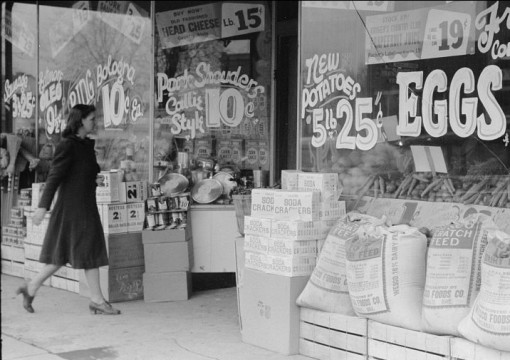What Have You Lost? No.7
Do you ever feel like somehow, despite advancements, the world is somehow less connected than you experienced growing up? Recently, I started a discussion on things we’ve lost along the way and invited readers to tell me how our social fabric has changed in their lifetimes. I’d love it if you’d tell me what you miss.
* * *
What Have You Lost? Family-Owned Grocery Stores
Mueller’s.
Walt’s.
Or, if you’re a neighbor of the Sesame variety, Mr.Hooper’s.
They were grocery stores named after the families who owned them.
Unlike the big box supermarkets where every store is laid out with uniform slickness, every independent store had the style (or lack thereof) of its hometown. They weren’t designed by central office, stocked with corporate brands or staffed by company trainees in matching polos.
Yes, there were a few big name food brands who sourced stores cross country, but by and large, each store’s stock was trucked in from its surrounding region. This included ordinary, earthy farmers whose corn and tomatoes lined the produce department racks.
Shelves were stocked with items the owner deemed worth selling because he needed desperately to make an honest living. When you paid the cashier, then, the money didn’t get funneled away to a posh skyrise no one had seen, to line the pockets of some corporate big shot no one knew. Instead, it put food on the table for the owner’s third grader who sat three seats in front of your own kid at the neighborhood elementary school. Or it paid the owner’s sister who started giving your kids a free cookie whenever you passed through the deli just because her best friend cut your hair.
On the every-so-often occasions when someone bought something on “credit,” it had nothing to do with interest rates or cash back opportunities. It meant, plain and simple, they were hard up that month. If the owner trusted them, he might trade them some food for a hastily scribbled IOU which he kept in the cash register drawer.
People in the community met in the grocery store, too, politely nodding to each other in the aisle or check out lane and occasionally exchanging pleasantries and gossip. Conversation topics included everything from the weather to the newly hired school superintendent. And in this way, the store was both a source of local news and a network of housewives who gave their product reviews in person instead of through Amazon.
Now, of course, outside of a few independent franchises, the grocery business is dominated by chains. But there are still a few things we can do to keep the community in food.
- Buy local. It’s still possible to find family owned stores in some areas. To find the ones nearest you, click here.
- Stop by a farmer’s market and pick up some locally grown vegetables or locally made food products. Most of the time, you’ll get better-tasting, more natural food and you’ll be supporting your local economy. Find your nearest Farmer’s Market at Local Harvest
- Head to the nearest orchard or farm and pick your own fruit and vegetables. Not only will you be able to hand select the best quality produce, but you have the experience of getting out into nature and picking it for yourself. Find a farm here.
- Join a food co-op, where people use their collective wisdom and cash to select and pay for the foods they want. They almost always save money by buying in bulk and sharing the bounty too. Find a co-op near you here.
- Give CSA a try (Community Supported Agriculture). You’ll pre-pay a set price, almost as if you’re buying stock in the farmer’s yearly crops. At harvest time, you cash in your “stock” for fresh, locally owned crops. Find your nearest CSA here.
- Work a community garden. Work with others to plant city or private lots, help contribute to the watering and the weeding, and in the end, split the harvest. Find a community garden in your area here.
Don’t forget to add your ideas here!
Read previous posts about the local ice cream store, cell phone addictions, front porch conversations, picking people up at the airport, riding bikes in the community or drive in movie theaters.

